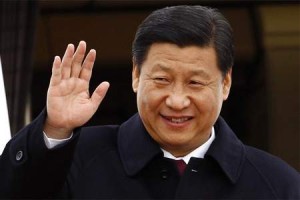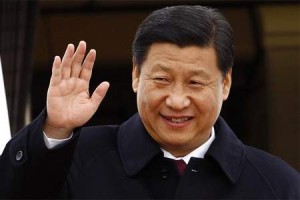Asia Times
FONG TAK HO
Nearly 3,000 delegates of the National People’s Congress (NPC), or legislature, are holding an annual meeting in Beijing to discuss China’s growth plan for the next five years.
While the Chinese parliament is viewed as a “rubber stamp,” the NPC, a carefully choreographed event, is not without behind-the-scene political tensions as question are raised on how the leaders are going to tackle the challenges facing a slowing economy.
One major focus of the 10-day conclave, which began on March 5 and ends on March 15, is fixing the growth target. This time, the leaders have given some wiggle-room by announcing a target range of 6.5% to 7% instead of being specific on GDP growth.
According to analysts, this is a clear departure from the past and it conveys a significant message to Chinese legislators: fasten your seat belt and prepare for contingency.
Last year, China said the economic growth would hover around 7%. Such a flexible view was necessary because the Middle Kingdom ended up with 6.9% growth — a 25-year-low.
Trouble at grassroots
It is essential for leaders to achieve the promised economic growth. By ensuring economic and social stability, the Chinese Communist Party earns people’s legitimacy.
Grassroots resentment is growing over the state of economy to such an extent that Wu Jie Xin Wen (News without Boundaries), a party-run website, recently published a letter demanding Chinese President Xi Jinping’s immediate resignation. One of the reasons cited in the letter was Xi’s failure on the economic front. Despite allegations that the website was hacked, there is some truth in what is written in the letter.
Xi is the leader of the ruling party’s central economic working group, effectively the final decision-making body for China’s economic policy. Therefore, he is supposed to be held accountable for any setbacks in the economy.
Stock markets too were agog with rumors that Xi was thinking of replacing Premier Li Keqiang, making him “responsible for what happened.” Although the rumors were baseless, they were floated ahead of an anticipated high-level reshuffle next year.
The concern of top leaders about such rumors was reflected in an internal circular leaked during the parliamentary meeting. The circular asked stakeholders in the stock market to “behave themselves.” All listing companies and securities brokers were told to “take care of the stability of the capital market”.
Amid skepticism, the Chinese government says the GDP and urban population income will double from 2010 to 2020 and the economy mass will reach $120 trillion. To reach that goal, China must achieve an annual growth rate of over 8% taking the inflation factor into account. But the gloomy global prospects have made this goal hard to achieve, if not impossible.
Tong Xiduo, a Beijing-based economist with the Chinese Academy of Social Science, a prominent central government think-tank, told Chinese media that the bottom line of 6.5% growth is associated with concerns over unemployment.
“It is calculated that when China’s growth is below [falling], unemployment will serve as a severe problem.” said Tong, who is an expert in macroeconomics. “Otherwise, the pressure of joblessness will be imminent.”
Some legislators, on the condition of anonymity, said the government would launch “decisive measures” if the growth rate is at anywhere close to the 6.5% alarming level. The measures will include further devaluation of yuan and changes in fiscal policy.
Li Daokwai, director of Beijing-based Centre for China in the World Economy, Tsinghua University, said that the flexible growth range will lend some room for local officials to formulate their own rescue plan to save the local economy. In the past, local officials were given tough targets to be achieved immediately. Under pressure, many of them resorted to short-term means that actually jeopardized long-term developments. The new flexible growth range is meant to prevent such mistakes.
China’s growth rate had fallen to around 7% three times – between fiscal years 1980 to 1981, 1990 to 1991, and 1997 to 1998 – after the Cultural Revolution. China managed to overcome these challenges.
In 1980, late paramount leader Deng Xiaoping solved the economic problems facing China by launching market reforms. Then in early 1990s, when China was suffering from international sanctions over the Tiananmen incident, Deng paid a symbolic and politically pivotal tour to southern Guangdong province in 1992 warning “unreformed-minded officials to step down.”
It is believed Deng’s remark was aimed at then Chinese President Jiang Zemin who was swaying between the ultra-left and Deng. Soon, China revived its capitalist-style economy and sailed through the most difficult moment of international isolation.
In late 1990s, then China’s economic tsar Zhu Rongji successfully led the country to overcome the turmoil of Asian financial crisis by shutting down many huge state-owned enterprises and joining the World Trade Organization.
The question now is, can China survive the upcoming challenge as it did in the past? If so, how?
First, Beijing has projected a budget deficit of 3% of GDP amounting to 2.18 trillion yuan (or $335.04 billion) for 2016. This is up from 2.3% of GDP in 2015. It is believed that the generous public spending spree is part of an effort to help boost the economy.
Jia Kang, an advisor to Beijing, said most of the newly expanded deficit was dedicated in various tax exemptions, which is an indirect way of helping private sector.
Urban pivot
Second, the government is pinning their hopes on an aggressive urbanization program.
Cai Fang, vice-president of the Chinese Academy of Social Science, said in a Beijing press conference that the latest urbanization policy would see 16 million people migrating from rural areas to cities by 2020, making the country’s urban population reach 45% of its 1.3 billion total. “With the realization of this urbanization scheme, we are actually killing three birds with one stone — the birds being solving labor shortage, increasing the overall productivity, and expanding demands for consumption,” Cai said. In addition, China has also announced a substantial increase of its poverty alleviation budget, which accounts to 43.4% rise when compared with that of last year. China expects to lift at least 10 million people out of poverty by the year-end.
Cai said Chinese leadership is attempting to boost its economy by putting more emphasis on demands, instead of supplies as in the past.
Whether China can come out of the woods remains uncertain. But one thing is for sure: solving all these problems will require a great deal of wisdom.




